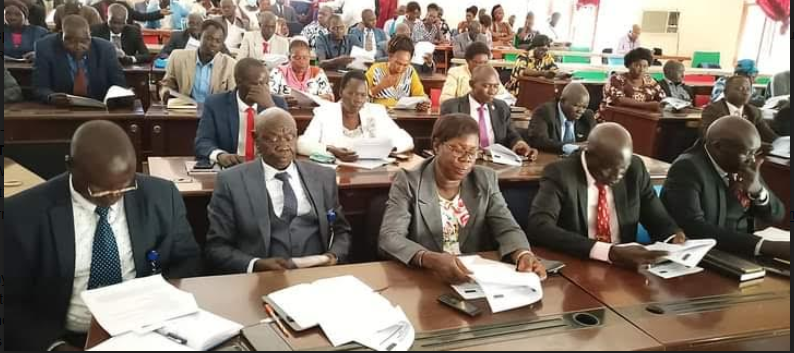The Eastern Equatoria State Legislative Assembly has reconvened following a two-month recess, with lawmakers returning to address the pressing challenges facing their constituents.
Many legislators on Monday emphasized the need for the government to prioritize peace, security, and infrastructure development to ensure essential services reach the population.
The state assembly officially adjourned its second session on April 14th this year, granting parliamentarians a two-month recess instead of the usual three, in accordance with the law. The delay in recess was primarily due to a financial crisis that prevented the timely disbursement of emolument funds for the legislators.
During the previous session, legislators engaged in deliberations on eight recent reports from various counties, approved the fiscal budget, and passed policy statements from sixteen State ministries.
In light of the previous delays, Rt. Hon. Severino Maira Janus, Speaker for the Eastern Equatoria State Transitional Legislative Assembly, has called on ministers to present their policy statements early to avoid similar setbacks in the future. Speaker Maira also expects ministers to provide updates on the implementation of previous plans before presenting new policies.
“In the last session, the delayed policy statements put significant pressure on the honourable members, with the assembly convening for 59 sittings. This time, I urge ministers to present their policy statements promptly to alleviate the strain experienced in the previous session. As we begin this new session, we expect ministers to update the August House on the progress made in implementing the plans passed by this parliament over the past year before presenting new policy statements,” stated Speaker Maira.
He further added, “Honorable members, I would like to inform you that the 2022/2023 budget, which you approved last session, has been acknowledged by the governor, and I have signed the certificate acknowledging its approval in accordance with the law. With the financial year drawing to a close this month, we are now awaiting the detailed financial report outlining the implementation of the provisions in the 2022/2023 budget by various spending agencies. The assembly requests the Minister of Finance to provide highlights on the implementation of the budget before the detailed financial report.”
Meanwhile, Governor Louis Lobong Lojore has encouraged leaders of political parties to collaborate and form cooperatives to foster economic sustainability. He urged lawmakers to propose projects to various partners to develop and deliver services to their respective constituencies.
“Mobilize resources and engage with stakeholders in the implementation of the state’s strategic development plan for 2022/2025. It is a collective responsibility, including you, members of the august house. Everyone should find a way to seek investors and engage with development partners who can contribute to your constituency’s progress. Legislators worldwide often initiate projects and collaborate with development partners and investors to ensure that services reach their constituencies,” explained Governor Lobong.
Governor Lobong expressed his appreciation for the commitment of United Nations agencies, Non-Governmental Organizations, Civil Society Organizations, Faith-Based Organizations, and Community-Based Organizations in providing services to the people of the state.
Visor Likale Olum, the deputy chairperson for Legal Affairs at the state assembly, suggested that peace and security should be the top priority for the parliament before addressing other matters.
“We strive for peaceful coexistence among our communities because peace is vital for stability and productivity, particularly in agricultural areas. We need our people to be self-reliant and engaged in activities that benefit them. However, as members of the government, we bear a significant responsibility to ensure the safety and security of our people, as some parts of the state are plagued by insecurity,” stated the lawmaker.
Olum added, “As legislators, we must also focus on scrutinizing the budget we passed in the previous session and evaluate its implementation by collaborating with our colleagues in the executive. We need to assess how the SSP 5 billion, which was approved by this parliament, was utilized. Without proper examination, it is difficult to move forward.”
Mary Juma, an opposition lawmaker from Budi County, emphasized the importance of prioritizing road infrastructure to ensure that services reach the population.
“There are numerous challenges in my area, and this applies to the entire state. Our primary focus will be on addressing the issue of roads. By establishing a well-connected road network, we can ensure the efficient delivery of services to our people, including healthcare, water, and other essential needs. Now that the parliament has reconvened, this will be our top priority,” she explained.
Regina Ihyerek, a lawmaker representing the SPLM-IO, highlighted the need to prioritize education and clean drinking water.
“We must address the lack of schools in certain areas. Additionally, the provision of clean drinking water is vital for the well-being of our citizens. These are the challenges that our constituents face,” she said.
Charles Onen Lokwaruk, the coordinator for the Eastern Equatoria State Civil Society Network, welcomed the reopening of parliament and urged lawmakers to focus on the reports generated during their recess.
“These reports capture the real needs and priorities of the people in Eastern Equatoria State’s eight counties. They will form a crucial foundation for decision-making in the state. Furthermore, this is the opportune time to present policies at the state level and enact bylaws concerning cattle raiding, early marriages, and the promotion of girl child education,” he remarked.




